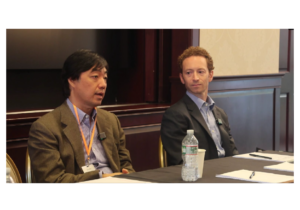
- Kyushu Railway Company Faces Second Proxy Fight with Fir Tree Partners
- ISS, Glass Lewis Backed Fir Tree Last Year But Activist Lost by Narrow Margin
- Kyushu Railway Company Appears Slow to Embrace Modern Corporate Governance
- Fir Tree Wants More Transparency, Nominated Three Directors with Financial, ESG Backgrounds
- Kyushu Railway Company Continues to Trade at Discount to Peers
Long known for entrenchment and all-too-cozy relationships with shareholders, Japan has made a concerted effort in recent years to bring corporate governance up to a higher standard. But as the case of Kyushu Railway Company shows, progress can be slow. Now, a longtime shareholder is making a second push to get the company on the right track.
Kyushu Railway Company, also known as JR Kyushu, is the incumbent railway operator on the Japanese island of Kyushu, where it operates the shinkansen “bullet train” along with hotels and real estate assets in other locations. It was the last of the major government-owned railway companies in the JR family to go public in 2016.
Fir Tree Partners, which invested at the IPO and now owns 6.1% of the company, made several proposals last year that narrowly failed to pass. The investment advisor asked the company to adopt a board structure designed for stronger corporate governance and suggested three directors who brought experience in finance and real estate. Notably, both Institutional Shareholder Services Inc. (ISS) and Glass, Lewis & Co. supported key elements of the Fir Tree proposal package.
Why did the proposals fail? Some of the reason likely has to do with traditional corporate relationships in Japan. Under the keiretsu system, Japanese companies formed a protection network involving cross shareholding, virtually ensuring boards and management were protected from voices of dissent. Corporate governance experts in Japan say many companies, especially former state-owned enterprises like JR Kyushu, are still hobbled by such traditional practices.
Indeed, high on the JR Kyushu shareholder register are companies such as West Japan Railway Company, East Japan Railway Company, and Kyudenko Corporation – all of which look unlikely to side with an activist. Even companies that do contract work such as construction projects may be required to own shares to get chance at bidding for an assignment, Japanese corporate governance experts say, which can further entrench incumbent management or directors.
Perhaps surprisingly, there was another shareholder last year that voted against all of the Fir Tree proposals: BlackRock, Inc. The U.S.-based asset manager (and the company’s biggest shareholder) even voted to leave one board seat empty rather than take any of Fir Tree’s suggestions. BlackRock has spearheaded a drive for better environmental, social, and governance (ESG) issues around the world, but appears to take a different stance in Japan.
That’s despite the fact that BlackRock publishes a voting framework indicating high corporate governance standards for Japanese companies. For example, according to the firm’s voting guidelines for Japanese companies, it supports an audit-committee structure or a three -committee structure. Fir Tree proposed a three-committee structure last year, which is regarded as the stronger of the two options for corporate governance, but BlackRock voted against it.
At least one large Japanese investor seems impatient with BlackRock. Japan’s Government Pension Investment Fund (GPIF), the world’s largest pension manager, pulled some assets from BlackRock in 2019. According to an interview with GPIF’s Chief Investment Officer in The Financial Times, BlackRock’s overall voting record played a role in the decision. “[W]e have been tracking the consistency of their engagement and proxy voting,” GPIF’s Hiro Mizuno said to the FT.
Spokesmen for BlackRock and Fir Tree both declined to comment to CorpGov.
This year, Fir Tree’s proposals look tougher to brush off. They don’t include buybacks or other measures that could be regarded as short-term solutions and instead focus on corporate governance issues.
One of Fir Tree’s requests is for better financial disclosure that will allow investors to evaluate JR Kyushu’s real estate assets, which account for roughly half of its profit. Fir Tree is asking for disclosure of revenues, EBITDA, net operating income and appraised cap rates for each of the company’s commercial and residential real estate assets, as well as growth capex details.
“We are keenly aware of the importance of disclosing information, and is constantly examining ways to enhance information disclosure of the real estate business,” JR Kyushu spokesman Yasuhisa Miura said in an email to CorpGov. “We believe the proposal from Fir Tree does not reflect the interest of other shareholders, whose needs we have been trying to recognize through engagement with our shareholders and investors.”
(Notably, BlackRock seems to value disclosure at Japanese companies. Its voting guidelines state that financial transparency “is crucial for a company to enjoy favorable valuations in the capital market. We thus expect companies to maintain a high level of accountability to their shareholders.”)

Also, Fir Tree has nominated three new directors – all Japanese with extensive experience in the country – who bring a skill set that is more important than ever as the company responds to the impact of the coronavirus. As the pandemic took its toll, JR Kyushu said it needs to focus on areas such as evaluation of financing alternatives, securing liquidity, and reevaluation of the business portfolio. Fir Tree worked with third parties to recommend directors on a friendly basis in the last several months but the company rejected all of them and again recommends one seat remain vacant.
One of Fir Tree’s nominees is Fumiyo Takei, who brings two decades of experience in investment banking and real estate, including roles at bulge-bracket banks and the Government of Singapore Investment Corporation (GIC). Ms. Takei is also a woman – an important addition to a board comprised of all but one man.
The second nominee, Yoshiko Nagao, is also a woman, with extensive background in real estate investment including roles at GIC and other major firms. She is also focused on ESG investing initiatives as an active member of NEXUS Global, The ImPact and Toniic, a global community of asset owners seeking to make a positive impact on the planet.
The third nominee, Daizo Motoyoshi, has a Columbia MBA and three decades of experience in finance. He also brings important ESG credentials as an Audit & Supervisory Board Member at The Board Director Training Institute of Japan, which promotes best governance practice to Japanese corporate leaders.
“Regarding Director election proposed by Fir Tree, we already appointed additional outside directors with knowledge of finance / IR and real estate (development) in June 2019,” JR Kyushu’s Mr. Miura said in an email to CorpGov. “Our Nomination and Compensation Advisory Committee discussed the skillsets of the Board of Directors necessary for increasing corporate value over the medium and long term, and decided that JR Kyushu should keep the existing structure of the Board of Directors and increase capable personnel who can promote ESG management and diversity.”
For Fir Tree’s directors to join the board, only two existing members need to exit since once seat is vacant. Fir Tree has suggested the removal of two people who have the longest tenure for outside board directors and appear to lack any real estate investment or ESG experience.
JR Kyushu looks undervalued relative to peers, especially considering its exposure to real estate, which tends to command a higher valuation than railway assets. The company trades at an enterprise value of 8.8 times March 2021 consensus EBITDA, according to Sentieo, an AI-enabled research platform. West Japan Railway Company trades at 9.7 times and Hankyu Hanshin Holdings Inc. trades at 12 times.
To narrow the valuation gap, change is likely needed at JR Kyushu. With the vote approaching later in June, investors would be well served to accept the latest shareholder proposals and get JR Kyushu on the corporate governance train.
Contact:
editor@corpgov.com
www.CorpGov.com
Twitter: @CorpGovernor







